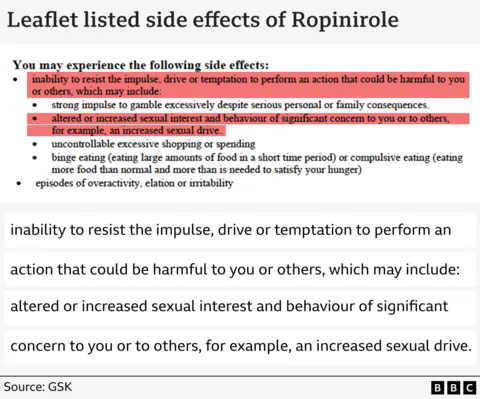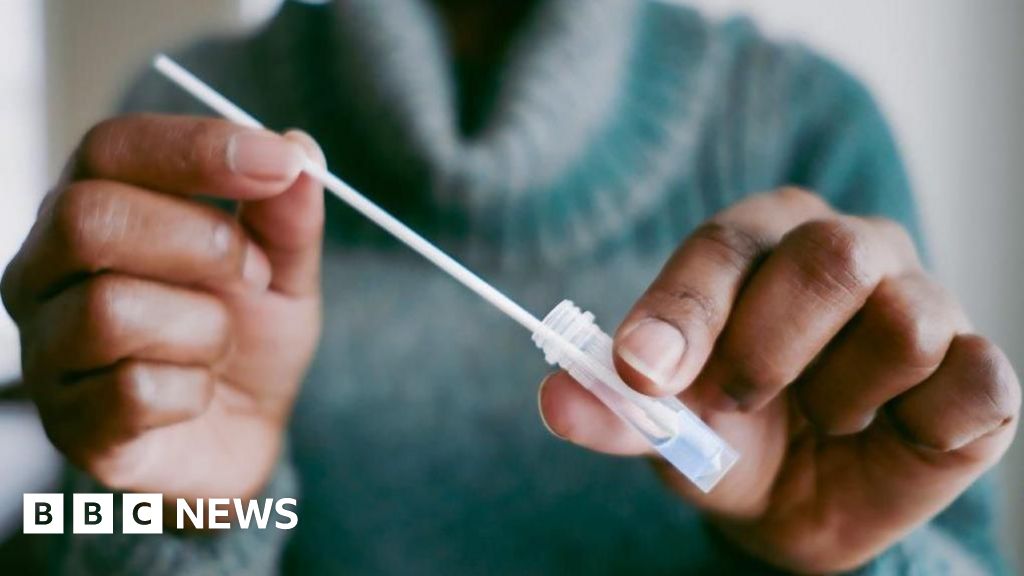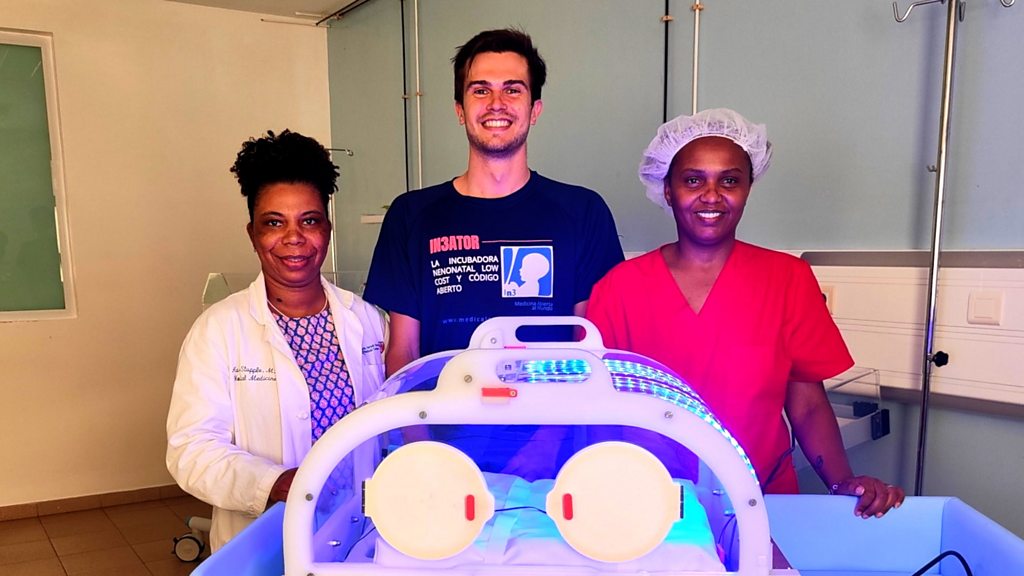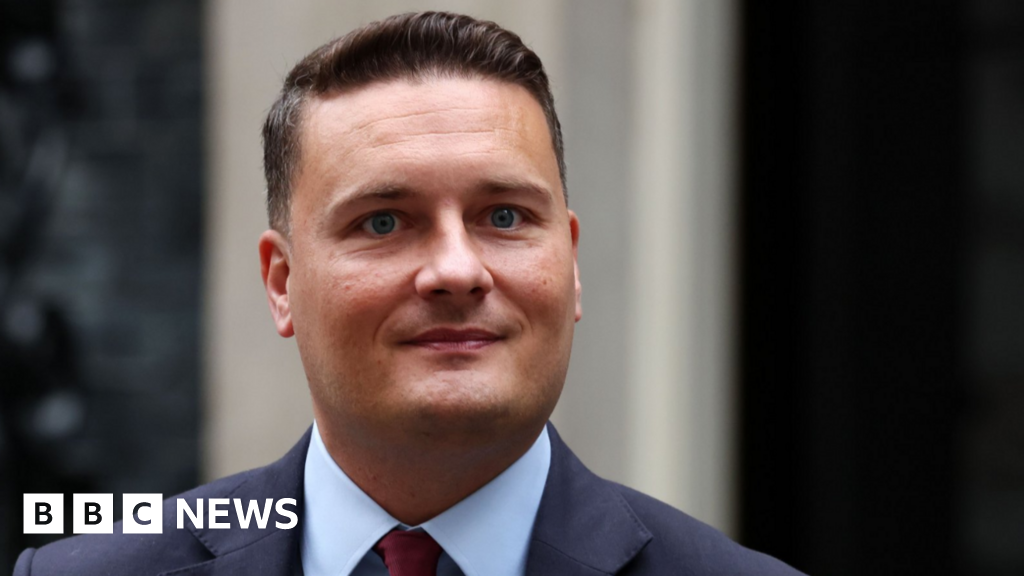
 BBC
BBC
Sarah says her elderly father's prescription drugs made him obsessed with porn
When "Sarah" climbed up into the attic of her father's house - she was completely unprepared for what she would find.
Her father, "James", was a modest man who worked most of his life for the same company. He retired about 20 years ago when he was diagnosed with Parkinson's.
He had managed the tremors and balance difficulties caused by the disorder by taking a prescription drug called Ropinirole.
But during the Covid-19 pandemic, Sarah had grown increasingly alarmed about her father's secrecy and wanted to see what he had been spending his time doing.
In the loft, she discovered reams of handwritten notes and a dozen recording devices he had been using to bug his own home.
In writing and on tape he had documented innocent sounds his wife had made as she moved around the house, and while she slept, to try to prove she was having an affair. He had also catalogued details of numerous chat lines and porn websites he had been obsessively using.
When Sarah told her elderly mother about what she had found, she was horrified to hear that James had also been sexually coercive towards her.
It was only when Sarah took him to see his specialist nurse five years ago that she learned the medication her father was on could have such extreme side effects.
"Oh, he's gone down the randy route, has he?" the nurse said.
The couple are now living separately in their old age, because James poses too much of a risk to his wife, says Sarah.
James lives in a specialist care home and Sarah says she has been told that he has sexually assaulted staff there.
"This medication has torn my family apart," says Sarah - whose name we have changed along with her father's.
Sarah has power of attorney for both her parents, including for their medical treatment.
She has carefully weighed their interests in deciding to tell her family's story, she says, but wants people to know about the impact the drugs can have.


Sarah discovered recording devices her father had been using to bug his own home
James's case is one of 50 the BBC has now been contacted about, the majority concerning men being treated for movement disorders whose behaviour changed dramatically after being prescribed medication from a specific family of drugs.
Often, behaviour changed after many years of taking the medicines at increasing doses, the men told us.
In March, we revealed how women had not been warned by doctors that taking the same type of medication for restless leg syndrome (RLS) could cause them to cruise for sex and gamble compulsively - placing them at personal risk and ruining their finances, careers and relationships.
Many of the cases we have now learned of involve the exploitation of women and children. These include:
- A man who was convicted of child sexual offences after abusing a child
- An octogenarian who says he has become addicted to pornography including bestiality and child abuse images
- A father of three children who said the drugs left him needing to have sex up to seven times a day - and caused him to walk out on two marriages when partners could not satisfy him
All three men said they had had no previous history of such sexual behaviour before taking the drugs. They also said they felt profound shame about their behaviour but believed the medication helped their conditions.
Other men the BBC spoke to said they did not want to take themselves off the drugs because the medication had led them to discover new sexual interests - which are legal and consensual - and because they enjoyed their increased libido.
One married grandfather in his 60s has begun crossdressing and has entered into online relationships with men. Another man says the drugs disinhibited homosexual feelings he had not previously explored.
Prescription records show that some of the men we spoke to tried reducing their dosage but all felt it had negatively impacted their health.
The Ropinirole that James takes belongs to a family of drugs known as dopamine agonists, which are prescribed for Parkinson's, RLS, pituitary tumours and other conditions.
The risk of impulsive behaviour side effects of dopamine agonist medication have long been known - but the BBC has discovered that doctors are still not warning all patients who have been prescribed the drugs for a variety of conditions.


Paulette Hamilton MP wants warnings in medication leaflets to be strengthened and made clearer
In March we revealed how British drug company GSK had found a link between Ropinirole and what it called "deviant" sexual behaviour - including paedophilia - in 2003.
GSK told the BBC it had shared these findings with health authorities, included this safety advice in medication leaflets, and conducted extensive trials for the drug which has been prescribed for 17 million treatments.
But warnings about such behaviour were not included in leaflets until 2007 - and, even now, only specify "altered" sexual interest and "excessive" or "increased" libido as risks.
Safety advice about the medication's "toxic" side-effects needs to be strengthened immediately because their impact can be "devastating", according to the acting chair of the Health Select Committee, Labour MP Paulette Hamilton.
"Nine out of 10 people do not read what is on those leaflets," she says.
"And if you do read it, what does it mean by altered sexual interest? I haven't got a clue."


The drugs work by mimicking the effects of dopamine, a natural chemical that helps transmit messages in the brain, such as those governing movement. Dopamine is also known as the "happy hormone" because it is activated when something is pleasurable or we feel rewarded.
Dopamine agonists can over-stimulate such feelings - helping sufferers of some movement disorders which may be caused by low levels of dopamine. But they can also diminish the appreciation of consequences, leading to impulsive behaviour - according to academics.
The medication can also actually worsen existing symptoms of restless legs - according to dozens of the people who spoke to the BBC - sometimes causing an uncontrollable urge to move in other parts of the body.
This is a well-documented risk for those who take the medication over a prolonged period, and is known as augmentation.
- If you have more information about this story, you can reach Noel directly and securely through encrypted messaging app Signal on: +44 7809 334720, by email at [email protected], external or on SecureDrop
The BBC has also learned of concerns about two studies that looked at the ability of another dopamine agonist drug - Rotigotine - to tackle such exacerbation of health conditions. Both were sponsored by the drug's manufacturer, Belgian firm UCB.
We have been told that senior officials at the company repeatedly dismissed evidence of augmentation caused by Rotigotine, during the first study in 2012.
One of its authors, Dr Diego Garcia-Borreguero, says UCB staff sat-in on and discussed findings with academics. He says the interference was "subtle", but that the published results were not impartial.
The BBC has also discovered that eight out of nine authors of a second Rotigotine study in 2017 had been paid at some point by UCB - and that five of them were direct company employees.
The paper's conclusions - that Rotigotine was effective in treating augmentation - are "ridiculous", according to Dr Andy Berkowski, a neurologist who has co-authored clinical practice guidelines for the treatment of RLS in the US.
He says data shows that more than 50% of the patients stopped taking the drug during the study largely because of adverse events or a lack of effectiveness - and more than half of those who completed it required an increase in dosage, potentially because of the worsening of their RLS symptoms.
UCB says its studies were unbiased, underwent independent peer review, and that authors who were its employees, or who it had prior affiliations with, fully complied with guidelines on disclosing conflicts of interest.
It said that Rotigotine's effectiveness was proven in multiple trials and most patients who completed its 2017 study experienced a significant clinical improvement. This corresponds to 37 of the 99 patients who began the study.
- A list of organisations in the UK offering support and information with some of the issues in this story is available at BBC Action Line.
Dopamine agonist drugs were prescribed nearly 1.5 million times by GPs alone in England last year, according to published data seen by the BBC.
Another drug, Aripiprazole - a partial dopamine agonist used to treat mental health problems - is also known to cause impulsive behaviours. It was prescribed for more than 1.7 million treatments in England alone last year, often to younger patients.
One patient taking the drug told us his compulsive gambling had become so bad that he was stealing to fund his habit. The mother of another believes the medication caused her son to expose himself in public.
The UK's drug safety regulator, the MHRA, says it has no plans to change its warnings about dopamine agonist drugs.
It previously told the BBC that sexual impulses vary and a general warning about activities which may be harmful is included.
The Royal College of GPs said its updated curriculum - which is used to train doctors and will be published next month - will now include the monitoring of impulsive behaviour side effects for RLS, thought to affect between 6% to 17% of patients.
A side effect can be considered to be "common" when it affects just 1% of the people who take the medicine, according to health guidance body NICE.
The Department for Health and Social Care did not comment.

 German (DE)
German (DE)  English (US)
English (US)  Spanish (ES)
Spanish (ES)  French (FR)
French (FR)  Hindi (IN)
Hindi (IN)  Italian (IT)
Italian (IT)  Russian (RU)
Russian (RU)  1 day ago
1 day ago
























Comments